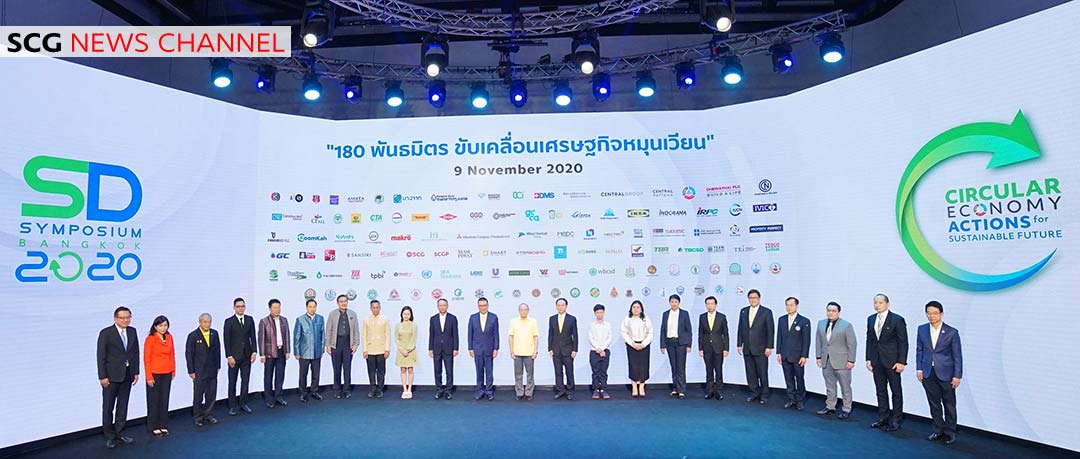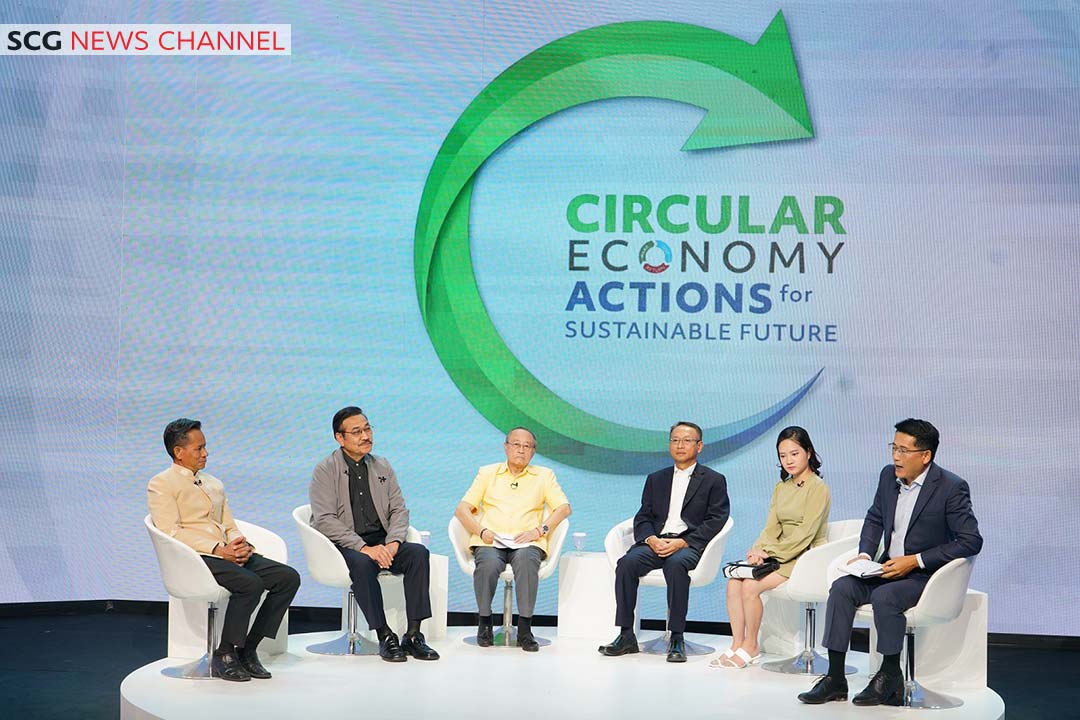Thailand and the World have hope again after facing global challenges including natural resource shortage, climate emergency, plastic waste from the Covid–19 lockdown, poverty and low quality of life and health problem caused by PM 2.5 dust. SCG and 180 alliances adopt circular economy principles to solve problem sustainably. The four solutions need to work on urgently are highlight in the event; 1. Solving drought with the water reuse management 2. Minimizing PM 2.5 dust with 100% Zero–burning agriculture as well as allowing farmers to access to the agriculture technology to create a steady income, 3. Proposing plastic waste management to be a national agenda and 4. Proposing the government to support the Green and Clean construction. The multi–sectoral collaboration prompts to expand networking and work with all sectors.

Roongrote Rangsiyopash, President and CEO of SCG and Tanawong Areeratchakul, Chairman of SCG Sustainable Development Committee together with 180 partners announce the progress of driving the circular economy into the society at the SD Symposium 2020 “Circular Economy: Actions for Sustainable Future”. The symposium aims at brainstorming ideas in solving on-going challenges such as how to relieve the impact of climate emergency, PM 2.5 dust, drought, flooding, natural resources shortage, the increasing of plastic waste from Covid-19 crisis. The multi-sectoral partnership has grown from 45 partners in the last year to 180 partners this year bringing various organizations to tackle pinpoints and include into the collaboration on four fundamental factors to make a better living with the circular economy principles.
- Building the water reuse management system; in preparation for the severe drought in the next year, the collaboration aim to drive farmers to become self-resilient in learning to adopt land readjustment method along with using the technology. In addition, to educate farmers and new farmers who return home from the Covid-19 economic impact and to expand the ideas nationwide, the government is requested to take part the project. The purpose of the project is to reduce social inequality, revive the community economy and to increase the country’s agriculture crop for Thailand becomes the world’s kitchen.
- Promote 100% Zero–burning agriculture within 2022 by circulating waste materials such as rice stubble, sugarcane leaves, hay by converting into alternative energy, biomass, animal feed and plant-based packaging will reduce PM 2.5 dust and generate revenue of 25,000 million Baht per year. In addition, introducing sharing economy idea in establish the community machine fund allowing famer to access to agricultural technologies in improving planting and harvesting processes as well as increase their yield without to invest nor own any machine.
- Urging to government to set the plastic waste management as national agenda; amend or add law regarding waste management and enforce it seriously. The plastic waste management system roadmap needs concrete framework and clear target and work process as well as allows all concerned parties to work together. The efforts also include promoting recycled products and provides tax privileges to the waste management and recycling business.
- Promote circular economy in the construction industry; Shitfing the industry to a Green and Clean Construction, the government needs to take the lead. The official should be a role model in setting up a new procurement guideline for mega infrastructure projects. Adopting technology to manage resources for maximum efficiency and minimize material waste also need to be included. Alternatively, to incentivize the contractor with a tax privilege to encourage them to shift to eco-friendly or recycle materials in the construction.

SCG pledged to reduce the greenhouse gas emission and lead the organization to Net Zero within 2050 joining the Paris Agreement to limit the temperature increase to less than 1.5 degrees Celsius. Moreover, SCG aware of the severe impacts of climate change and waste problems, the company has adopted the circular economy into the business operation. To achieve sustainability goals, SCG has set the strategy as follows;
- Packaging Business applies the principles of Circular Economy in various aspects of business operations. In terms of product design solutions, our focus is on designing products to use less resources and those can be reused or recycled. The efficient supply chain management process is already in place as well as to increase the proportion of recycling in the production process.
- Chemical Business has applied technology to put circular economy into practice throughout the supply chain, ranging from product development (enhancing the recycling capability such as Mono-materials) and plastic recycling technology development (increasing the proportion of wastes as raw material) to digital platform development as a tool for waste sorting and collecting (creating waste free communities and supporting waste banks operation).
- Cement–Building Materials Business emphasizes on the technology with the innovation integration to develop the products and services to meet customers and the environmental needs under “SCG Green Choice”. The label offers the products made from recycled material, finished product that reduces waste in the installation process. And products and services help to reduce energy consumption or use renewables such as solar energy. These efforts lead to “Green Living and Green Society” which include reused waste materials under the campaign “Turn Waste to Wealth” to benefit the society.
 ดาวน์โหลดข่าว
ดาวน์โหลดข่าว